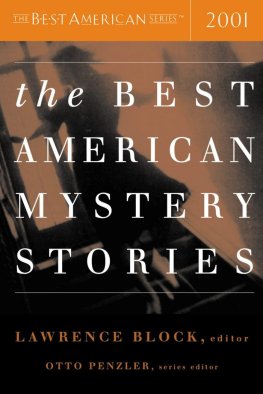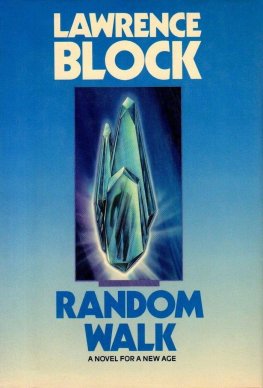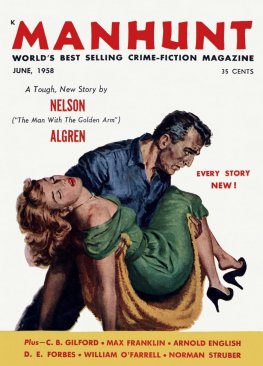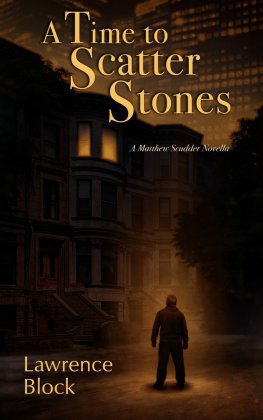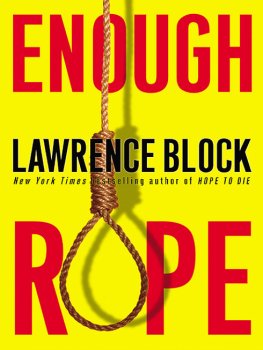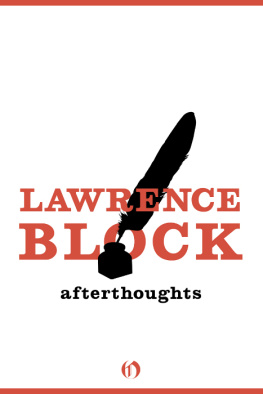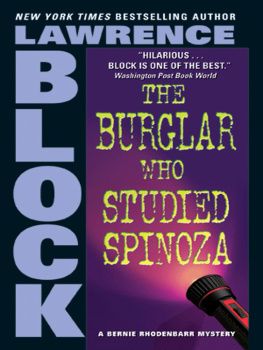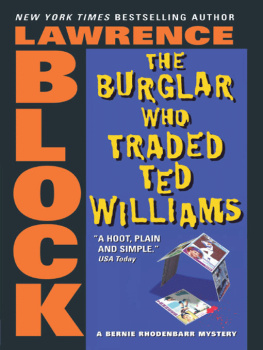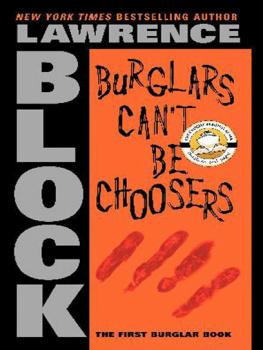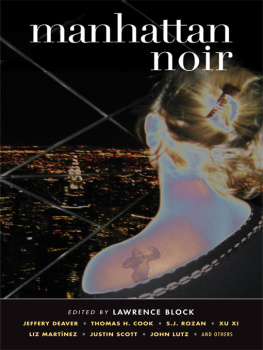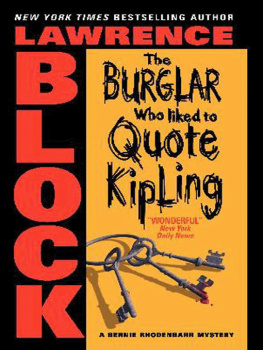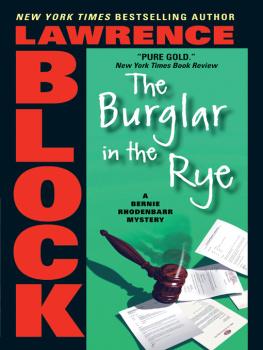Lawrence Block
One Night Stands and Lost Weekends
To the gormless young man
who wrote these stories
and the hapless editors who bought them
In 1999 the small press publisher Crippen & Landru brought out a limited hardcover edition of twenty-five previously uncollected early stories of mine. I called the book One Night Stands, as most of the stories were written in a single session.
The Lost Cases of Ed London followed two years later, consisting of three novelettes narrated by a private detective whose name you can very likely infer.
I was by no means convinced that any of these stories needed to return to print, and yet I didnt want to deprive collectors and specialists of access to them. So I chose to limit their availability to these hardcover collectors editions, and not to allow them to be reprinted in paperback form.
Here you have the contents of both volumes, assembled together in a handsome but reasonably priced trade paperback edition. How come? What happened that led me to change my mind?
More important, I think, is what didnt happen. No one who bought either book wrote to the publisher to demand his money back or to me to savage me for foisting such crap upon the reading public. Now this doesnt necessarily mean that anybody liked the stories; for all I know, collectors bought them and admired them and placed them with pride upon their shelves, never bothering to read the damned things. While I might have worried that reissuing them would damage whatever remains of my reputation, well, it didnt.
And heres something that did happen: Sometime in the mid-nineties I got an e-mail from my friend Evan Hunter. Hed been approached by Charles Ardai of Hard Case Crime about the possibility of HCCs reissue of a group of stories Evan had written and published some forty years earlier. They featured a Bowery derelict named Matt Cordell, a former cop who pulls himself together sufficiently to handle a case and then falls apart again. Evan wasnt sure he wanted to see those stories back in print, and he wondered what my experience had been with the publisher and with reissuing early work.
I was able to vouch for Ardai and Hard Case Crime, and I was also able to put in a word for Matt Cordell. I remembered those stories well Id read all of them when they appeared and I assured Evan that neither he nor they had anything to apologize for. And for what its worth, I said, heres how I make this sort of decision. When Im faced with two courses of action, I try to pick the one that brings money into the house.
Why should I sit in judgment of my early work? Why should I limit its readership to collectors with full wallets? Why not opt instead for the choice that will bring in a few dollars?
Once Id come around to that way of thinking, I didnt need to do a lot of heavy lifting. My publishers and I agreed that both books should be combined into a single volume, or if you prefer, a double volume English is a curious language, isnt it? And was there a title that might serve for such a book?
I still liked One Night Stands as a title, but it didnt really fit the Ed London novelettes. Theyd taken longer to write a few days, certainly. I couldnt remember whether Id written them on the weekend or during the week I could barely recall having written them at all, to tell you the truth but as soon as the new title came to mind I liked it, and so did the good people at HarperCollins.
We also decided that the original introductions should stay, and so youll find them here, one immediately after this one, the other preceding the novelettes.
Theres one other thing I should talk about here, and thats a story that was included in One Night Stands as a separate pamphlet. Its tucked into the main body of this new edition, but it isnt mentioned in the original introduction, and I probably ought to remedy that.
The story was my only real attempt at science fiction, a genre I rather liked and certainly respected, but not one to which my talents and imagination seemed to lend themselves. My agent liked the story and sent it everywhere, and it always came back, until it landed at Science Fiction Stories, that market of last resort edited by Robert A. W. Lowndes. (They paid half a cent a word, but my agency insisted they get a minimum of ten dollars for a story. They took their one buck commission, and I netted nine dollars. Funny what you remember.)
Laurence Janifer, a friend of mine who liked the story far more than it could possibly have deserved, brought it to the attention of Judith Merril, known as the little mother of science fiction, who chose it for her very prestigious best-of-the-year collection. Go figure.
The planet on which the story takes place is called Althea in a nod to the Richard Lovelace poem To Althea from Prison, which begins, Stone walls do not a prison make. I accordingly called the story Make a Prison, although thats not a very good title, is it? If I had wanted a good title, all I had to do was move on to the poems second line: Nor iron bars a cage. Now thats a title. And, since I get to decide these things, thats the title its going to have from now on, starting right here in this volume: Nor Iron Bars a Cage. The rest of the storys not much, Larry Janifer and Judy Merril notwithstanding, but thats a damn nice title.
Lawrence Block
New York
2008
Introduction
If Memory Serves...
In 1956, from the beginning of August through the end of October, I lived in Greenwich Village and worked in the mail room at Pines Publications. I was a student at Antioch College, in Yellow Springs, Ohio, which sounds like a hell of a commute, but thats not how it worked. At Antioch students spent two terms a year studying on campus and two terms working at jobs the school arranged for them, presumably designed to give them hands-on experience in their intended vocational area. Like a majority of students, I had spent my entire freshman year on campus. Now, at the onset of my second year, I was ready to begin my first co-op job. I knew I wanted to be a writer, so I went through the schools list and picked a job at a publishing house.
Pines published a paperback line, Popular Library, a batch of comic books, and a couple dozen magazines, including some of the last remaining pulps in existence. (Ranch Romances, I recall, was one of them. It was what the title would lead you to believe.) I worked five days a week from nine to five, shunting interoffice mail from one desk to another, and doing whatever else they told me to do. My weekly salary was forty bucks, and every Friday I got a pay envelope with $34 in it.
I lived in the Village, at 54 Barrow Street, where I shared a one-bedroom apartment with two other Antioch co-ops. My share of the monthly rent was $30, so I guess it fit the traditional guideline of a weeks pay. I know I never had any money, but I never missed any meals, either, and God knows it was an exciting place to be and an exciting time to be there. (I was eighteen, and on my own, so I suppose any place would have been exciting, but at the time I thought the Village was the best place in the world. Now, all these years later, I havent changed my mind about that.)
I didnt do much writing during those months. Id realized three years earlier that writing was what I wanted to do, and every now and then I actually wrote something. Poems, mostly, and story fragments. I sent things to magazines and they sent them back. At Antioch, I taped the rejection slips on the wall over my desk, like the heads of animals Id slain. Sort of.
One weekend afternoon, I sat down at the kitchen table on Barrow Street and wrote You Cant Lose. It was pretty much the way it appears here, but it didnt end. It just sort of trailed off. I showed it to a couple of friends. I probably showed it to a girlfriend, in the hope that it would get me laid, and it probably didnt work. Then I forgot about it, and at the end of October I went back to campus.

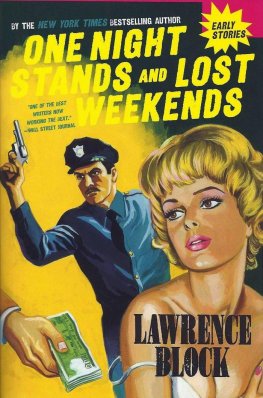
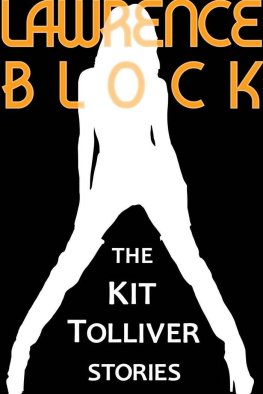
![Lourens Blok - Death Pulls a Doublecross [= Cowards Kiss]](/uploads/posts/book/873811/thumbs/lourens-blok-death-pulls-a-doublecross-cowards.jpg)
